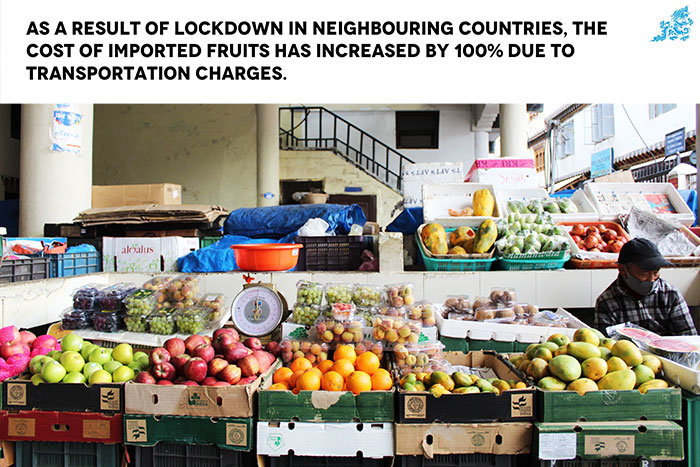… Fruit vendors worried about supply
Choki Wangmo
Despite lockdown in West Bengal (WB), India, which is one of the primary import routes to Bhutan, Agriculture Minister Yeshey Penjor said that the country has stocked up essential items that will last about three months.
On May 16, West Bengal announced a 14-day lockdown due to the surge in Covid-19 cases.
Lyonpo said that although consumers might be deprived of choices, the country won’t face shortage of fruits and vegetables with increased local production in the market.
According to records with Food Corporation of Bhutan Limited (FCBL), Bhutan has stocked 8,918.80 metric tonnes (MT) of rice, 792.94MT of refined oil, and 353.68MT of pulses from January till this month.
Most of the items were imported from WB. As of last month, 5,281.3 MT of rice, 764.55MT of oil, and 655.08 MT of pulses were imported from WB.
FCBL Director, Dorji Tashi, said that the National Food Security Reserve Action Plan mandates the corporation to primarily focus on rice, cooking oil, and pulses during times of disaster like the current pandemic. “However, we maintain stock of other essential items such as salt, sugar, butter, Amul cheese, tea, coffee, and detergents.”
About 180MT of salt and 180MT of sugar are also stocked up.
The office did not get any instructions from the government on imports of fruits and vegetables, Dorji Tashi said.
He said that regardless of the lockdown in WB, movement of essential items are expected to continue. “We have already stepped up our procurement of essential food items.”
Even if the import stops from the state, he said that FCBL started importing from three strategic entry points – Phuentsholing, Gelephu, and Samdrupjongkhar—since the outbreak of Covid-19.
FCBL, however, is faced with challenges. With stringent transport protocols to ensure safety, Dorji Tashi said that it affected supply efficiency and timely distribution to schools and their stores in the dzongkhags.
He said that due to the rapid situation created by Covid-19, FCBL had to suddenly increase essential food items beyond their regular market demand. “FCBL’s existing infrastructure is too small to accommodate the entire stock for three months and most of the items get damaged in warm areas.”
“In places like Gelephu, Samdrupjongkhar, and Nanglam, hiring of private spaces is a big challenge. In some places, we are adjusting with school MP halls as an interim measure to store our stocks,” he said.
Although the agriculture ministry set in measures to increase production within the country, Bhutan’s import in 2019 increased by Nu 144 million compared to 2018. Meat, rice, diary products, fruits and vegetables were among the major food items imported from India.
Due to the pandemic, the import figure increased last year, with an import value of 42.57MT of vegetables and fruits from December 2020 to January this year.
The situation in WB, however, has worried vendors. A fruit vendor at the Centenary Farmers’ Market (CFM), Lhakpa Dorji, said that his fruit stock will finish by this week. With meagre local production, he doesn’t have many choices but to quit the job he was in for the last many decades.
He said that local production won’t be able to meet the market demand. “We were awaiting watermelon supply from Zhemgang but we were told that due to disease outbreak, it was damaged.”
Currently, local produce like peach, sugarcane, strawberry, cucumber, and bananas have reached the market but on a small scale.
The prices of imported fruits have increased by 100 percent due to transportation charges, the vendors said. For example, a carton of fruits which cost Nu 2,700 in the past costs Nu 4,700 now.
Another vendor said that the supply hasn’t reached her yet. There was no information from the suppliers as well. “Most of my produce is bought from WB. My stock might last another week.”
Pema Wangdi, who has been in the fruit business for more than 10 years, said that without substantial local production, Bhutanese have become dependent on the Indian market. His order for the week was not approved by the supplier.
“I have registered online with the agent, but it wasn’t approved and there was no information,” he said.
“If the situation remains the same, it will impact our livelihoods,” Pema Wangdi said.


